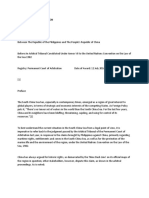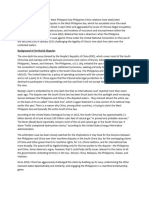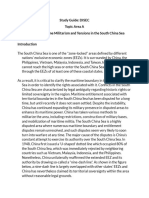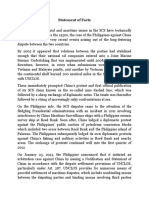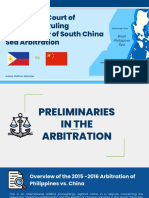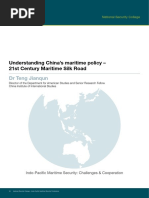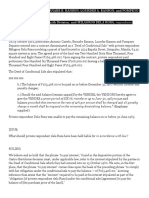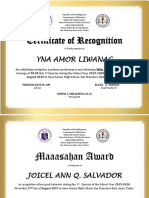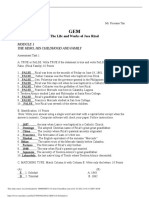Orthodox View: The Riddle of The Scarborough Shoals
Uploaded by
Sernande PenOrthodox View: The Riddle of The Scarborough Shoals
Uploaded by
Sernande PenOrthodox View Article 7 of the New Civil Code When the courts declare a law to be inconsistent with the
Constitution, the former shall be void and the latter shall govern. Norton vs. Shelby An unconstitutional act is not a law, it confers no rights, it imposes no duties, it affords no protection, it creates no office; it is, in legal contemplation, inoperative as though it had never been passed. Modern View It simply refuses to recognize it and determines the rights of the parties just as if such statute had no existence. The decision affects the parties only and there is no judgment against the statute. The opinions or reasons of the court may operate as a precedent for the determination of other similar cases, but it does not strike the statute from the statute books; it does not repeal, supersede, revoke, or annul the statute. The parties to the suit are concluded by judgment but no one else is bound.
The riddle of the Scarborough Shoals
By Peter Lee What's the standoff between China and the Philippines over an atoll in the South China Sea all about? Is it a matter of seafood and sovereignty ... or gas fields and gambling? To an outside observer, the antics of China, the Philippines, Vietnam, Japan, Taiwan and Malaysia over conflicting territorial claims smack of farce auditioning for tragedy, and ridiculous claims abound. Most notorious is the infamous Chinese nine-dash line, a scrotum-shaped outrage that extends from Hainan Island to brush the shores of Vietnam, Malaysia and the Philippines, and encompasses almost the entire South China Sea. Less well known, perhaps because of Western sympathies
toward non-Chinese claimants, is what might be termed the Vietnamese flying rectangle. It uses a claim over the Paracel Islands south of Hainan (which China seized in a bloody and much-resented incident in 1974) to project a claim through the center of the South China Sea almost to the western shore of the Philippines. Beyond overlapping lines on the map, the situation is compounded by the welter of weather stations and lighthouses various claimants have erected and defended on the various forsaken rocks and atolls in the sea to strengthen their sovereignty claims.
These discontinuous and opportunistic claims make a mockery of any attempt to divide the atolls into neat, rational jurisdictions. It would seem the only way out of this mess would be joint development through some regional mechanism. So when China asserts a nine-dash line claim far from its mainland and close to the shore of some overmatched country like the Philippines and repudiates any form of third-party mediation, the Chinese action is understandably attributed to some combination of arrogance, obtuseness and appetite for aggression. Reuters threw another possibility in the mix: that the Chinese government has lost its geopolitical marbles and its South China Seas policy is simply a stewpot of conflicting ad hoc initiatives. As tension mounted at Scarborough Shoal, the Brussels-based International Crisis Group warned in a report late last month that China's poorly coordinated and sometimes competing civilian agencies were inflaming frictions over disputed territory. "Any future solution to the South China Sea dispute needs to address the problem of China's mix of diverse actors and construct a coherent and centralized maritime policy and law enforcement strategy," it said. [1] But a closer look reveals that there is some genuine method to the madness and the Chinese government has drawn certain lessons from past maritime debacles, most notably the Diaoyutai/Senkaku Islands crisis with Japan. In the matter of the Scarborough Shoal mess, it should be admitted that the Philippines started it. In 2009, the Philippine government passed the Philippine Archipelagic Baseline Law asserting jurisdiction over Scarborough Shoal (which it calls the Panatag Shoal and China calls Huangyan Dao). The Chinese ambassador promptly protested, and the Philippine government declared it would work on the issue with China under the guidelines of the Declaration of the Conduct of Parties in the South China Sea, a standstill agreement between China and the 10-member Association of Southeast Asian Nations (ASEAN) calling for self-restraint and peaceful resolution of disputes. [2] No apparent progress was made, and on April 11, 2012, the Philippine navy stopped and boarded eight Chinese fishing vessels in the shoals. In order to demonstrate that the Chinese fishermen had not been innocently deep-sea fishing in the area, the navy took pictures of one of the crews standing on a pile of giant clams presumably taken from the shoal. The Philippine government made noises about arresting the Chinese crew for poaching. This scenario has a familiar ring to it, if one remembers the Diaoyutai/Senkaku Islands incident of 2010. It began with a similar confrontation between Chinese fishing boats and Japanese Coast Guard vessels. That situation rapidly escalated thanks to the intemperance of the Chinese captain, who collided with Japanese Coast Guard vessels while trying to evade boarding, and the political calculations of Seiji Maehara, the ambitious Japanese home minister and darling of the US State Department. In the Japanese case, the boat was seized and the crew arrested, a trial of the obdurate Captain Zhan was threatened and, when China predictably went ballistic and choked off rare earth shipments, Maehara jetted off to obtain the support of the US government. The rest is China-bashing history as the Diaoyutai/Senkaku incident became the centerpiece of argument that a strong ASEAN-US alliance was necessary to forestall Chinese bullying in the South China Sea. History did not repeat itself in the Scarborough Shoals case. First of all, two Chinese Coast Guard vessels popped over the horizon and placed themselves between the Philippine navy cutter and the fishing boats, preventing a seizure of the vessels and crews.
Secondly, when President Benigno Aquino tried to pull a Maehara and invoke US backup for the Philippines position, he was met with an open rebuff in the most unlikely of venues: the "2+2" meeting in Washington between the Defense and Foreign ministers of the US and the Philippines, a major reboot of the fraught security relationship between the two countries and an obvious venue for some bracing freedom/alliance/strategic pivot rhetoric. However, as the Philippine Daily Inquirer reported on May 2: The United States says it will help build the Philippines' sea patrol capability but will not take sides in that nation's standoff with China at a disputed shoal in the South China Sea ... [US Secretary of State Hillary Clinton] voiced concern about Scarborough Shoal, repeating that Washington does not take sides on competing sovereignty claims ... [3] Actually, this was also the United States position on the Diaoyutai/Senkaku confrontation. The Barack Obama administration had already notified the Japanese government that it would not explicitly include the Diaoyutai/Senkaku islands in the scope of the US-Japan Security Treaty. The only difference was, the US didn't explicitly state its position and let Maehara, by then Japan's foreign secretary, spin the situation to his advantage, something that most media outlets overlooked in the furor but Asia Times Online reported at the time: After Maehara visited with Secretary of State Hillary Clinton in New York, AFP reported: "According to the Japanese minister, Clinton said that the Senkakus ... are subject to Article 5 of the bilateral security treaty, which authorizes the US to protect Japan in the event of an armed attack 'in the territories under the administration of Japan'," the report said. Whatever was said in private, publicly the State Department did not inject itself in the controversy by explicitly extending the US security umbrella over the Senkakus. According to the AFP report, State Department spokesperson Crowley limited himself to the observation that the Senkaku issue was "complicated". [4] After the 2+2 confab, the Philippine Foreign Ministry tried to tear a page from the Japanese playbook and unilaterally claim US backup. However, lacking the temerity to assert that the Mutual Defense Treaty covered Scarborough Shoal issue (as Maehara had done for Senkaku/Diaoyutai), the Department of Foreign Affairs statement had little impact: The United States has publicly declared four times that it would honor the 1951 Mutual Defense Treaty that obliges American troops to help defend the Philippines if it comes under attack, the Philippine Department of Foreign Affairs (DFA) said on Wednesday. [5] In 2012, the US government apparently decided not to accord the Philippines and Aquino the same slack it gave Japan and Maehara in 2010. This probably has less to do with Clinton's timidity about pulling the tail of the Chinese dragon than it does with the Philippines' status as a Tier II Asian ally, a rung far below the favored position of Japan. Japan, after all, is the primary host for America's military facilities in the Pacific; the constitution of the Philippines, on the other hand, explicitly precludes the establishment of foreign military bases inside the country. More to the point, Japan, now actively working to free itself from the straitjacket of its peace constitution, is a military and economic powerhouse with a tradition of anti-Chinese aggression it has never quite repudiated, and the capability, doctrine, and public support to serve as the local surrogate for whatever contain-China policy the US selects. The Philippines, on the other hand, is cruelly described as a military doormat. It's also a doormat that probably reads "Welcome China". Over 20% of Filipinos are of Chinese extraction or claim a partially Chinese heritage; Filipino Chinese are
also a major commercial force within the country. Closer commercial and investment ties with mainland China are an obvious potential solution to the economic woes of the Philippines. The Philippines is, therefore, a US ally of questionable reliability and efficacy. In order to gain the full backing of the United States it would probably have to do a few things, like finding a way to expand the US military presence beyond the 650 troops currently "rotating" through the Philippines (and almost violating the Philippine constitution) for anti-terrorism advisory duties; buying a significant quantity of US armaments; and showing suitable anti-Chinese bravado. So far, the Aquino government has come up short in these three categories, for a variety of political and economic reasons. The Scarborough Shoal affair, in particular, has been markedly lacking in anti-Chinese catharsis. In the past four weeks, a variety of fishing and enforcement vessels have wandered in and out of the shoal as the foreign ministries of China and the Philippines engaged in jaw-jaw amid the usual jingoistic idiocy of cyber-attacks, half-hearted demonstrations, eye-glazing parsing of legal and historical claims to the atoll, and provocative rhetoric in state-run or state-friendly media. This week, both countries announced a fishing ban covering the shoal, while insisting, albeit unconvincingly, that their parallel actions were nothing more than coincidental unilateral moves to protect the region's precious marine resources from over-fishing. In practical terms, the ban also represented a further mutual de-escalation of the conflict, at least until it erupts again. This unproductive sound and fury - with the unnerving possibility that a regional conflict might break out over a coral atoll filled with giant clams - would seem to strengthen the case that bilateral negotiation of these contentious issues is a dead end, and a multilateral dogpile under the aegis of ASEAN and the United Nations is needed. The Philippine government has called for UN mediation of the dispute according to the Law of the Sea Treaty; the Chinese government has obdurately refused. Does the Chinese government have a coherent strategy for resolving the conflicts brought on by its overbearing claims in the South China Seas? Contrary to the superficial appearance of bilateral futility in the Scarborough Shoals case, it appears that the answer is "yes". And China's approach has nothing to do with cherishing the South China Seas as a shared resource and everything to do with treating it as an attractive business opportunity. As journalist Rossia Robles pointed out in an in-depth series of
posts, the Philippine anxiety over the Scarborough Shoal has little to do with the material value of the fishing grounds or the psychic gratification of asserting sovereignty over the atoll. The critical issue for the Philippines in the South China Sea (or, as it is inevitably referred to in Manila, the West Philippine Sea) is energy. [6] There's gas in them thar seas. Maybe not enough gas to revolutionize the world's balance of petropower; but enough gas to afford the Philippines financial breathing space and a heightened measure of security and national dignity. The Philippines currently has one offshore gas operation, Malampaya, in production under a less-thanwonderful deal with Shell and Chevron by which the Philippine government currently gets 18% of the revenues from the sale of the gas. Even so, the deal delivers about US$1 billion per year to the Philippine government. Part of Malampaya's revenue is plowed into military expenditures. The most recent addition to the Philippine Navy, the BRP Gregorio del Pilar - which put in an appearance at the Scarborough Shoal before discreetly withdrawing - is the reincarnation of the US Coast Guard cutter USCGS Hamilton, purchased from the United States in 2011 for $13.8 million funded by the Philippine Department of Energy "for the security of oil platforms and oil exploration activities in Palawan and Sulu Sea". [8] Bewilderingly, the Philippine government named this ship - the first tangible fruit of Aquino's security tilt toward the United States - after a hero of the Philippine-America War who died in combat against US forces in 1899. During the Japanese occupation of the Philippines, the puppet government issued medals commemorating Del Pilar's last battle, apparently as a celebration of of anti-Western/anti-colonial defiance. [8] The Chinese nine-dash line (which exists only as a line on Chinese government maps and has never been translated into a surveyed territorial boundary claim) appears to skirt Malampaya. China has not made a major issue of Malampaya. However, the Chinese government has used its ninedash line as grounds to challenge the Philippine government's right to sell licenses to an even bigger and as yet unexploited nearby undersea gas field at Reed Bank, known by the Philippine government as "Recto Bank". [9]
Malampaya will be used up in a decade or so, if projections hold. Recto Bank could be the big one, with enough gas to last a century. One would assume that the Philippine government hopes to get a better deal than Malampaya, as well as using cheap natural gas to bootstrap its economic development. In contrast to the 50-50 deal on Malampaya, the concession for Recto Bank-SC 72-is owned 100% by various Philippine resource companies and their various Hong Kong and Canadian incarnations. It would appear that China does not harbor serious hopes of claiming Recto Bank for itself. It is, however, interested in becoming the operating partner that will exploit Recto Bank's trillion-plus cubic meters of gas on behalf of the concessionaires. One might also speculate that the Chinese government wishes to forestall the possibility that Manila will use Recto Bank money to fund further purchases of US military equipment and establish the Philippines as a prosperous, independent and credible bulwark against China, a mini-Japan as it were. Therefore, even as China and the Philippines engaged in their war of words over Scarborough Shoal, Philex - the majority owner of Recto Bank's SC-72 - was invited to Beijing for exploratory discussions with the China National Offshore Oil Corporation (CNOOC) concerning possible cooperation. Another strong indication of China's interest in Recto Bank was the appearance of China's first deep water oil rig, CNOOC's semi-submersible 981, north of the Paracels. The announcement was a provocative thumb in the eye to Vietnam, which claims the area. It was also an advertisement of China's capabilities in deep-water exploitation and, perhaps, a veiled threat that China could send its semi-submersibles lumbering into contested waters to "drink the Philippines' milk shake" if Manila continued to be obdurate. [10] It would appear likely that the Philippines would prefer to find a suitable non-Chinese partner for Recto Bank in order to preserve its political and economic independence from China. However, China is playing hardball. In addition to slapping aside Manila's rather feeble attempt to draw the line at Scarborough Shoal, the Chinese government has made it clear that any foreign company bidding for Philippine concessions in the South China Sea is asking for trouble. [11] Manila also compounded its problems by trying to obtain bids for a parcel near the Paracels, thereby incurring the wrath of Vietnam and making it extremely awkward for the United States to show its support. As the Scarborough Shoal crisis bubbled on, the Chinese government also took steps to show the Philippines where its economic interests lie; Philippine banana exports to China have been disrupted on the pretext of a bug infestation. [12] More significantly, China's National Tourism Administration issued a travel safety advisory in response to the Philippine government's apparently half-hearted attempt to whip up nationalist sentiment over the Scarborough Shoal, which culminated in the appearance of a few hundred demonstrators in front of the Chinese Embassy - and a policeman stopping a man from trying to burn a Chinese flag. In response, Chinese tour groups canceled their Philippines bookings, charter flights from China were cut back, and suffering was inflicted on the budget tour operators and hoteliers that rely on Chinese tourists. China ranks as only the fourth-largest provider of tourists to the Philippines, although the number of tourists has grown by an impressive 78% over the last year. It is, however, interesting to speculate that the cutback in tourists was meant to send a message to an
outspoken opponent of Chinese participation in Recto Bank - Enrique Razon, a Philippine port and resource tycoon whose Monte Oro Resources Energy owns a 30% stake in SC-72. On May 9, Razon criticized Philex's discussions with CNOOC, while impugning the patriotism of Philex's president. He insisted that any CNOOC stake would have to come out of Philex's share without diluting Monte Oro's, presumably a deal-breaker for Philex. He told the Philippine Daily Inquirer: As the only Filipino-owned company in SC-72, bringing in the Chinese is a colossal sign of weakness and poor judgment. Discussing the possible resources in Recto Bank is an ill-advised move. [13] In addition to owning a big stake in Recto Bank, Razon controls one of the four groups that have won concessions to open casinos in Manila. After offshore gas, casino gambling is the Philippine government's great hope for economic renewal. Revenue from games of chance is already the third-largest contributor to the bottom line of the Philippine government. When "Entertainment City" and its casinos come on stream over the next five years, the Philippine government is hoping to surpass Singapore and Las Vegas with annual gaming revenues of $10 billion. [14] Razon's group is making a billion-dollar bet that the Philippines can attract Asian business - and siphon off Chinese gamblers from Macau. On February 8, Razon told the Inquirer: "Maybe we could get a [huge] share of that market. China is a big market [for the project]." [15] If Razon is interested in Chinese gamblers, maybe he should not have dumped on China's oil ambitions so publicly and cuttingly. The flow of mainland Chinese gamers to Macau is controlled by the Chinese government, which recently capped the number of times government officials who happen to be gambling addicts could visit the territory to once every three months. The precedent of the Philippine travel advisory could be construed as a warning that the Chinese government could also throttle back the flow of future mainland Chinese gamblers to the Philippines as well, to the detriment of Razon's casinos - or perhaps, under the proper circumstances, encourage travel to Entertainment City even if it detracted from the immense revenues China siphons off from Macau. It's all a matter of dollars and cents, in other words. The Chinese approach to the South China Sea may provide a successful paradigm. If there is enough money to be made by developing resources in the South China Seas now, other countries - and corporations - may be willing to cut deals with China on a bilateral basis in order to unlock the revenues they crave. If the tangled issues of the South China Sea are to be approached from the perspective of multi-lateralism, mediation and international law, on the other hand, they may very well prove to be intractable and a source of contention (and the US intervention that China resents) for near eternity. Gas and greed, not law and principle, may turn out to be the key to peace in the South China Sea. Scarborough Shoal (sometimes referred to as Scarborough Reef) is located in the eastern reaches of the South China Sea, situated 220 km west from the island of Luzon in the
Philippines (see panoramic image), 553 km southeast from Bombay Reef in the Paracel Islands and 345 km northeast from the Spratly Islands; its nearest neighbour in the region is the small Truro Shoal, 180 km to the northwest. The reef is triangular in shape, covering an area of some 150 km, measuring roughly 19 km in length and 13 km in width. Scarborough Shoal is a sunken atoll formation consisting of a narrow reef rim, back reef slopes and a central lagoon that contains a deep basin towards the south. A single passage on the southeastern rim, 350 m in width, connects the interior with the open sea. With the exception of several coral rocks, the entire reef is submerged. The reef is claimed by the Philippines (due to its geographical proximity) and by China (for historical reasons) where it is known as Huangyan Island.
Scarborough shoal issue reaches UN
Share On FacebookShare On MyspaceShare On StumbleuponShare On DiggShare On EmailShare On Print|Share On Facebook_likeMore|
Saturday, May 5, 2012 FOREIGN Affairs Secretary Albert del Rosario met with United Nations Secretary-General Ban Ki-moon to advance the Philippines commitment to settle the recent territorial disputes in the West Philippine Sea through a rules-based approach based on international laws. In a meeting at the United Nations headquarters in New York City, both officials agreed on the importance of peaceful settlement of disputes and mediation. Have something to report? Tell us in text, photos or videos. Del Rosario reiterated the Philippine governments commitment to finding a peaceful solution on the dispute based on the United Nations Charter on the United Nations Convention on the Law of the Sea (UNCLOS) and on applicable international laws. We believe that the unfolding events are of great interest to all nations, as they have a stake in the peace and stability of this economically and politically strategic area, he said. The Philippine government has continuously decried the allegedly Chinese intrusions in its territorial waters over the past year.
The latest row in the Panatag Shoal, which sits just 124 nautical miles away from Zambales province and is within the countrys 200-nautical mile Exclusive Economic Zone (EEZ) and continental shelf, started when Philippine forces boarded eight Chinese fishing vessels to confiscate illegally caught marine species. Two Chinese surveillance ships immediately arrived and put themselves between the BRP Gregorio del Pilar, Manilas largest warship, and the Chinese fishing vessels. The Philippines see this as an incursion into its territory since the Panatag Shoal sits about 500 nautical miles from China. Beijing and Manila has overlapping claims over the contested waters in the West Philippine Sea, which includes the Spratly and Paracel Islands, as well as the Panatag Shoal. China maintains its claim on the whole sea while the Philippines, Taiwan, Malaysia, Vietnam and Brunei Darussalam have claims on parts on potentially resource-rich Spratly Islands. In the meeting, Ban highlighted the importance of instruments on the peaceful settlement of disputes. The Philippines has led efforts in the United Nations to mark the 30th anniversary of the adoption of the 1982 Manila Declaration on the Peaceful Settlement of Disputes this year through a General Assembly resolution that calls on member-states to promote and observe in good faith the historic declaration. Ban welcomed the Manila-initiated resolution, which was approved by consensus at the recent session on the Special Committee on the Charter of the United Nations. The resolution is currently up for adoption at the Sixth Committee and the General Assembly. I hope that our work on promoting mediation will build on the groundwork already laid by the Manila Declaration, Ban said, adding that preventing conflict is one of my five priority agendas in the UN.
You might also like
- Thayer, South China Sea Disputes: Global StakeholdersNo ratings yetThayer, South China Sea Disputes: Global Stakeholders4 pages
- In The Matter of The South China Sea Arbitration100% (1)In The Matter of The South China Sea Arbitration5 pages
- Territorial and Border Conflicts: The West Philippine Sea: Contemporary Issues 10No ratings yetTerritorial and Border Conflicts: The West Philippine Sea: Contemporary Issues 103 pages
- The Alteration of The Philippines Foreign Policy Towards China Over Disputes in The South China SeaNo ratings yetThe Alteration of The Philippines Foreign Policy Towards China Over Disputes in The South China Sea24 pages
- China's Position Paper On PH-initiated Arbitration Case Over South China Sea Dispute100% (1)China's Position Paper On PH-initiated Arbitration Case Over South China Sea Dispute26 pages
- Position Paper of The Government of The PeopleNo ratings yetPosition Paper of The Government of The People25 pages
- David vs. Goliath in The South China Sea Maritime DisputeNo ratings yetDavid vs. Goliath in The South China Sea Maritime Dispute6 pages
- South China Sea Arbitration Background and HistoryNo ratings yetSouth China Sea Arbitration Background and History16 pages
- Lilia, Ma. Angelika C. - Scarborough Shoal - SourceNo ratings yetLilia, Ma. Angelika C. - Scarborough Shoal - Source5 pages
- Meraluna Bolongabong Esparagoza Critique PaperNo ratings yetMeraluna Bolongabong Esparagoza Critique Paper8 pages
- Republic of The Philippines Polytechnic University of The Philippines Maragondon Annex Alfonso CampusNo ratings yetRepublic of The Philippines Polytechnic University of The Philippines Maragondon Annex Alfonso Campus46 pages
- Legal Analysis of South China Sea Dispute: An Emphasis On Philippines V. China Arbitration Case (2016)No ratings yetLegal Analysis of South China Sea Dispute: An Emphasis On Philippines V. China Arbitration Case (2016)24 pages
- Brief Description of The Issue On WEST PHILIPPINES SEA CONFLICT100% (2)Brief Description of The Issue On WEST PHILIPPINES SEA CONFLICT4 pages
- Montevideo Convention On The Rights and Duties of The StatesNo ratings yetMontevideo Convention On The Rights and Duties of The States4 pages
- Thayer China's Enduring Interests in The South China SeaNo ratings yetThayer China's Enduring Interests in The South China Sea5 pages
- Germany Takes A More Outspoken and Active Position On The South China Sea DisputesNo ratings yetGermany Takes A More Outspoken and Active Position On The South China Sea Disputes19 pages
- Territorial and Maritime Disputes in East AsiaNo ratings yetTerritorial and Maritime Disputes in East Asia3 pages
- Understanding China's Maritime Policy 21st Century Maritime Silk Road - Teng JianqunNo ratings yetUnderstanding China's Maritime Policy 21st Century Maritime Silk Road - Teng Jianqun5 pages
- Integrated Realty Corporation vs. Philippine National Bank100% (1)Integrated Realty Corporation vs. Philippine National Bank2 pages
- PHILIPPINE GLOBAL COMMUNICATIONS, INC., Petitioner, vs. RICARDO DE VERA, Respondent. Decision Garcia, J.No ratings yetPHILIPPINE GLOBAL COMMUNICATIONS, INC., Petitioner, vs. RICARDO DE VERA, Respondent. Decision Garcia, J.13 pages
- G.R. No. 147839 June 8, 2006 GAISANO CAGAYAN, INC. Petitioner, Vs - INSURANCE COMPANY OF NORTH AMERICA, Respondent. FactsNo ratings yetG.R. No. 147839 June 8, 2006 GAISANO CAGAYAN, INC. Petitioner, Vs - INSURANCE COMPANY OF NORTH AMERICA, Respondent. Facts4 pages
- Santos Ventura Hocorma Foundation vs. SantosNo ratings yetSantos Ventura Hocorma Foundation vs. Santos6 pages
- Farinas Vs Executive Secretary, G.R. No. 147387, December 10, 2003No ratings yetFarinas Vs Executive Secretary, G.R. No. 147387, December 10, 20032 pages
- Certificate of Recognition: Yna Amor LiwanagNo ratings yetCertificate of Recognition: Yna Amor Liwanag13 pages
- A Study of The Philippine Government During The Spanish RegimeNo ratings yetA Study of The Philippine Government During The Spanish Regime195 pages
- Region III ORP Pampanga Jesus C. Simbulan: OPP BataanNo ratings yetRegion III ORP Pampanga Jesus C. Simbulan: OPP Bataan2 pages
- Certificate of Appreciation: Tambayan NG Po-Aps & FriendsNo ratings yetCertificate of Appreciation: Tambayan NG Po-Aps & Friends19 pages
- List of Non Reader Updated Enrollment Languyin Es - 053149No ratings yetList of Non Reader Updated Enrollment Languyin Es - 0531498 pages
- Lesson 09: The Propaganda Movement and La SolidaridadNo ratings yetLesson 09: The Propaganda Movement and La Solidaridad25 pages
- Certified List of Candidates For Congressional and Local Positions For The May 13, 2013 2013 National, Local and Armm ElectionsNo ratings yetCertified List of Candidates For Congressional and Local Positions For The May 13, 2013 2013 National, Local and Armm Elections2 pages
- 4 Major Period in The Life of Dr. Jose Rizal (1892-1896) Dapitan Exile, Trial & ExecutionNo ratings yet4 Major Period in The Life of Dr. Jose Rizal (1892-1896) Dapitan Exile, Trial & Execution23 pages
- 05 CONSTI1 - Ang Bagong Bayani-OFW Labor Party vs. COMELEC (G.R. No. 147589)No ratings yet05 CONSTI1 - Ang Bagong Bayani-OFW Labor Party vs. COMELEC (G.R. No. 147589)2 pages
- This Article Is About The Philippine National HeroNo ratings yetThis Article Is About The Philippine National Hero9 pages
- Binislakan:: Short History Costume: Female: Male Music Count: FormationNo ratings yetBinislakan:: Short History Costume: Female: Male Music Count: Formation2 pages
- Thayer, South China Sea Disputes: Global StakeholdersThayer, South China Sea Disputes: Global Stakeholders
- Territorial and Border Conflicts: The West Philippine Sea: Contemporary Issues 10Territorial and Border Conflicts: The West Philippine Sea: Contemporary Issues 10
- The Alteration of The Philippines Foreign Policy Towards China Over Disputes in The South China SeaThe Alteration of The Philippines Foreign Policy Towards China Over Disputes in The South China Sea
- China's Position Paper On PH-initiated Arbitration Case Over South China Sea DisputeChina's Position Paper On PH-initiated Arbitration Case Over South China Sea Dispute
- David vs. Goliath in The South China Sea Maritime DisputeDavid vs. Goliath in The South China Sea Maritime Dispute
- South China Sea Arbitration Background and HistorySouth China Sea Arbitration Background and History
- Lilia, Ma. Angelika C. - Scarborough Shoal - SourceLilia, Ma. Angelika C. - Scarborough Shoal - Source
- Republic of The Philippines Polytechnic University of The Philippines Maragondon Annex Alfonso CampusRepublic of The Philippines Polytechnic University of The Philippines Maragondon Annex Alfonso Campus
- Legal Analysis of South China Sea Dispute: An Emphasis On Philippines V. China Arbitration Case (2016)Legal Analysis of South China Sea Dispute: An Emphasis On Philippines V. China Arbitration Case (2016)
- Brief Description of The Issue On WEST PHILIPPINES SEA CONFLICTBrief Description of The Issue On WEST PHILIPPINES SEA CONFLICT
- Montevideo Convention On The Rights and Duties of The StatesMontevideo Convention On The Rights and Duties of The States
- Thayer China's Enduring Interests in The South China SeaThayer China's Enduring Interests in The South China Sea
- Germany Takes A More Outspoken and Active Position On The South China Sea DisputesGermany Takes A More Outspoken and Active Position On The South China Sea Disputes
- Understanding China's Maritime Policy 21st Century Maritime Silk Road - Teng JianqunUnderstanding China's Maritime Policy 21st Century Maritime Silk Road - Teng Jianqun
- Integrated Realty Corporation vs. Philippine National BankIntegrated Realty Corporation vs. Philippine National Bank
- PHILIPPINE GLOBAL COMMUNICATIONS, INC., Petitioner, vs. RICARDO DE VERA, Respondent. Decision Garcia, J.PHILIPPINE GLOBAL COMMUNICATIONS, INC., Petitioner, vs. RICARDO DE VERA, Respondent. Decision Garcia, J.
- G.R. No. 147839 June 8, 2006 GAISANO CAGAYAN, INC. Petitioner, Vs - INSURANCE COMPANY OF NORTH AMERICA, Respondent. FactsG.R. No. 147839 June 8, 2006 GAISANO CAGAYAN, INC. Petitioner, Vs - INSURANCE COMPANY OF NORTH AMERICA, Respondent. Facts
- Farinas Vs Executive Secretary, G.R. No. 147387, December 10, 2003Farinas Vs Executive Secretary, G.R. No. 147387, December 10, 2003
- A Study of The Philippine Government During The Spanish RegimeA Study of The Philippine Government During The Spanish Regime
- Region III ORP Pampanga Jesus C. Simbulan: OPP BataanRegion III ORP Pampanga Jesus C. Simbulan: OPP Bataan
- Certificate of Appreciation: Tambayan NG Po-Aps & FriendsCertificate of Appreciation: Tambayan NG Po-Aps & Friends
- List of Non Reader Updated Enrollment Languyin Es - 053149List of Non Reader Updated Enrollment Languyin Es - 053149
- Lesson 09: The Propaganda Movement and La SolidaridadLesson 09: The Propaganda Movement and La Solidaridad
- Certified List of Candidates For Congressional and Local Positions For The May 13, 2013 2013 National, Local and Armm ElectionsCertified List of Candidates For Congressional and Local Positions For The May 13, 2013 2013 National, Local and Armm Elections
- 4 Major Period in The Life of Dr. Jose Rizal (1892-1896) Dapitan Exile, Trial & Execution4 Major Period in The Life of Dr. Jose Rizal (1892-1896) Dapitan Exile, Trial & Execution
- 05 CONSTI1 - Ang Bagong Bayani-OFW Labor Party vs. COMELEC (G.R. No. 147589)05 CONSTI1 - Ang Bagong Bayani-OFW Labor Party vs. COMELEC (G.R. No. 147589)
- This Article Is About The Philippine National HeroThis Article Is About The Philippine National Hero
- Binislakan:: Short History Costume: Female: Male Music Count: FormationBinislakan:: Short History Costume: Female: Male Music Count: Formation







